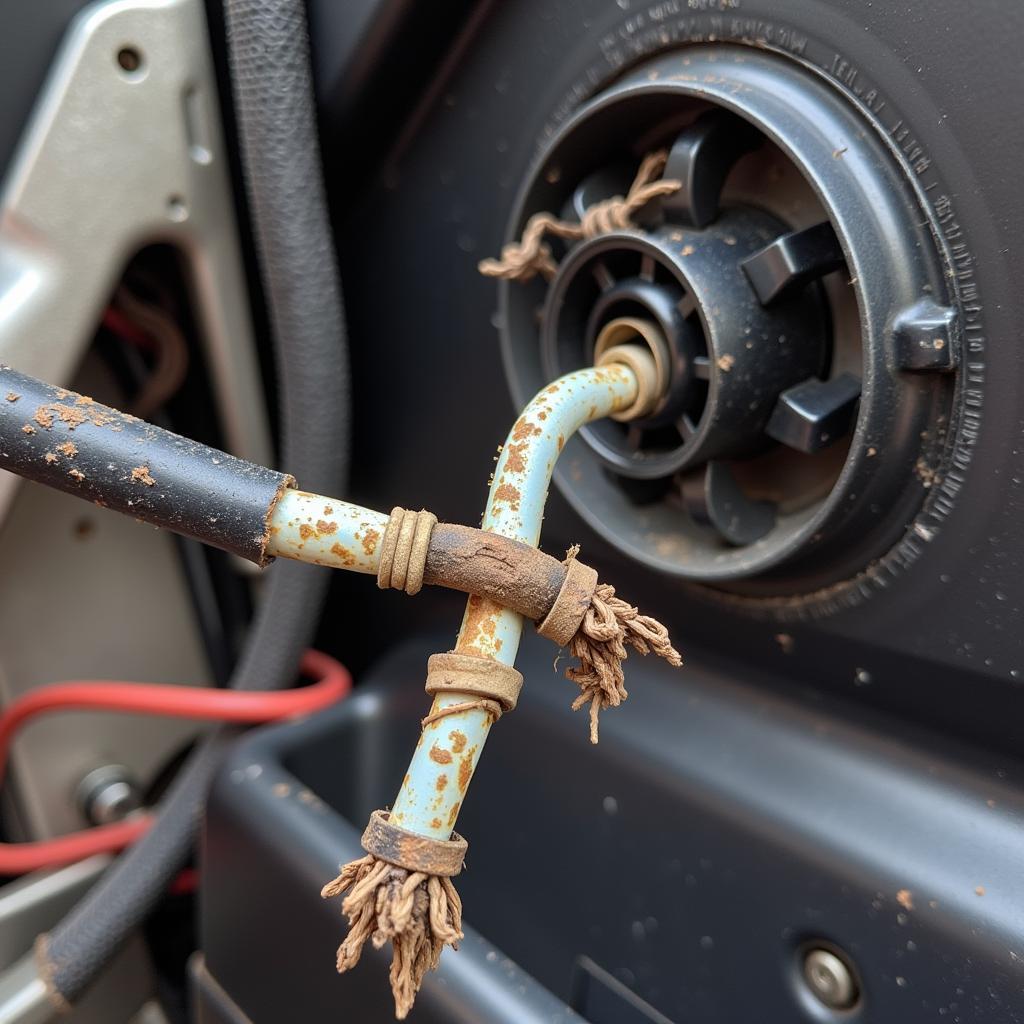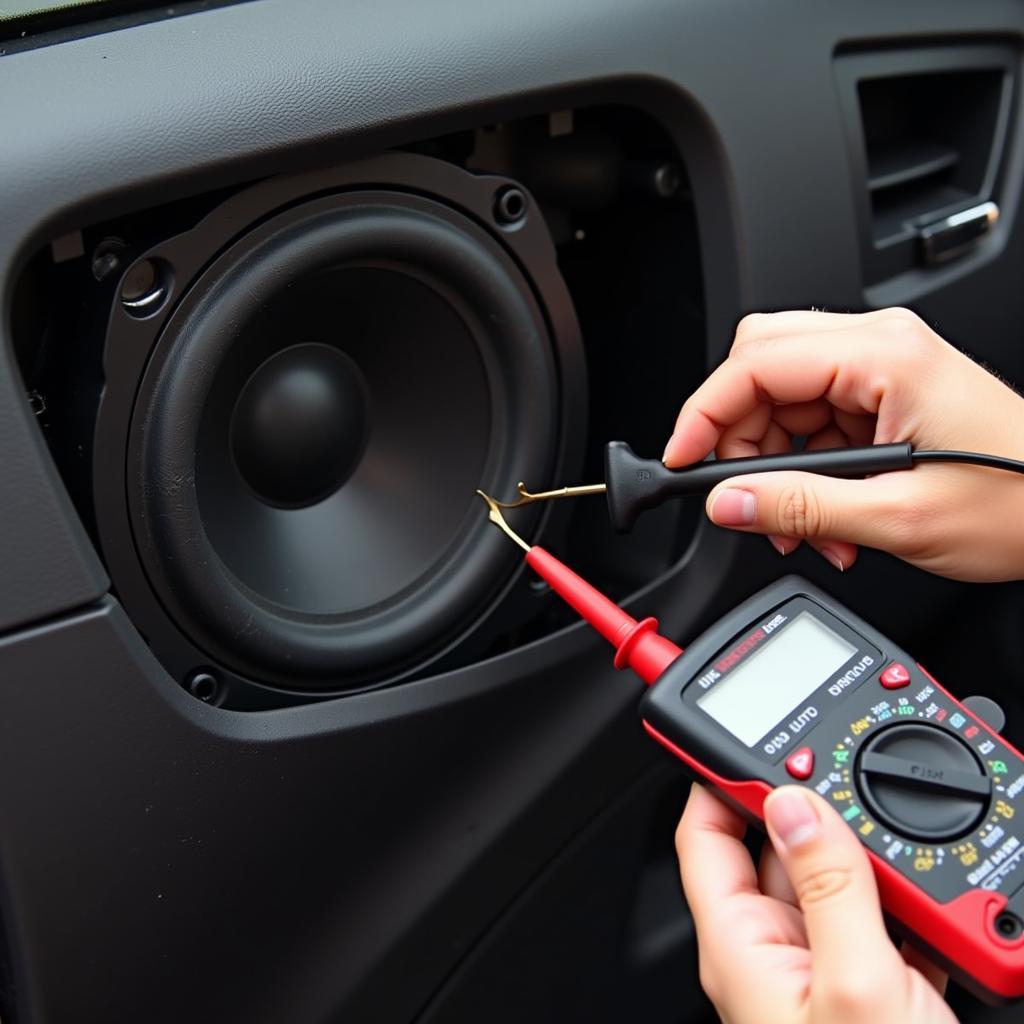Experiencing a Car Speaker Low Volume Problem can be incredibly frustrating. Whether you’re cruising down the highway or stuck in traffic, clear and robust audio is essential for an enjoyable driving experience. This comprehensive guide will delve into the common causes of low speaker volume in cars and provide practical solutions to help you regain your listening pleasure. We’ll explore everything from simple checks to more complex troubleshooting steps, empowering you to diagnose and fix the issue.
If you recently upgraded your stereo and are now having sound issues, you might find helpful information in this article about new car radio causing speaker problems.
Identifying the Culprit: Common Causes of Low Car Speaker Volume
A car speaker low volume problem can stem from various sources, often interacting in complex ways. Pinpointing the root cause requires a systematic approach, starting with the most common culprits.
- Speaker Wiring Issues: Loose, corroded, or damaged speaker wires are a frequent cause of low volume. Check for any visible damage to the wiring and ensure all connections are secure.
- Faulty Head Unit/Amplifier: A malfunctioning head unit or amplifier can significantly reduce the output to your speakers. Test the head unit with different audio sources and check the amplifier for any signs of damage or overheating.
- Speaker Problems: Blown or damaged speakers are an obvious cause of low volume. Listen for distortion, crackling, or buzzing sounds, which can indicate a speaker problem.
- Incorrect Fader/Balance Settings: Sometimes, the solution is as simple as adjusting the fader and balance controls on your head unit. Make sure these settings are properly configured to send audio to all speakers.
- Low-Quality Audio Source: If you’re using a low-bitrate audio source, such as a heavily compressed MP3 file, the volume might seem lower than expected. Try playing a high-quality audio file to see if this is the issue.
 Car Speaker Wiring Issues Causing Low Volume
Car Speaker Wiring Issues Causing Low Volume
Diagnosing and Fixing the Problem: A Step-by-Step Guide
Now that we’ve identified the potential causes, let’s explore how to diagnose and fix the car speaker low volume problem.
- Check the Fader/Balance: Start with the simplest solution. Ensure the fader and balance controls on your head unit are correctly set. This often overlooked step can save you a lot of time and effort.
- Inspect the Speaker Wiring: Visually inspect the speaker wires for any damage, loose connections, or corrosion. If you find any issues, repair or replace the affected wiring. Use a multimeter to test the continuity of the wires if necessary.
- Test the Head Unit: Try playing different audio sources through your head unit. If the volume is low regardless of the source, the problem likely lies within the head unit itself. Consider having it checked by a professional.
- Test the Amplifier (if applicable): If your car has an external amplifier, check its connections and ensure it’s receiving power. Listen for any unusual noises coming from the amplifier. If it’s overheating or producing distorted sound, it might need to be repaired or replaced.
- Check the Speakers: Carefully examine each speaker for physical damage. Gently press the speaker cone to check for any rubbing or scraping sounds. If you suspect a blown speaker, test it with a multimeter or consider replacing it.
 Testing a Car Speaker with a Multimeter
Testing a Car Speaker with a Multimeter
You might find solutions for similar speaker issues in our article covering Kenwood car stereo problems.
“A common mistake people make is assuming a low volume problem is always related to the speakers themselves,” says John Miller, a seasoned automotive electrician. “Often, it’s a simple wiring issue or a misconfigured setting on the head unit.”
Advanced Troubleshooting Techniques
If the basic troubleshooting steps haven’t resolved the issue, consider these more advanced techniques:
- Check the Ground Connections: A poor ground connection can cause a variety of electrical problems, including low speaker volume. Ensure all ground connections are clean, tight, and secure.
- Test the Speaker Impedance: Use a multimeter to measure the impedance of your speakers. Mismatched impedance between the speakers and the head unit/amplifier can lead to low volume.
- Use an Oscilloscope: An oscilloscope can help you visualize the audio signal and identify any distortions or anomalies that might be causing the low volume.
Sometimes, a new speaker can unexpectedly have volume issues. Explore our guide on car replacement speaker low volume problem for more insights.
Preventing Future Problems
Once you’ve resolved the car speaker low volume problem, take these steps to prevent future issues:
- Regularly Inspect Wiring: Periodically check your speaker wiring for any signs of wear and tear. Address any issues promptly to prevent more significant problems.
- Use High-Quality Audio Sources: Opt for high-quality audio files to ensure optimal sound quality and volume.
- Protect Your System from Moisture: Moisture can damage your car’s electrical components, including the speakers and wiring. Keep your car’s interior dry and avoid exposing your audio system to excessive humidity.
“Preventive maintenance is key to a long-lasting car audio system,” advises Maria Sanchez, a certified car audio technician. “Regularly inspecting your wiring and taking steps to protect your system from moisture can save you a lot of headaches down the road.”
Having problems with your Pioneer system? Take a look at our article on pioneer car audio problem for helpful solutions.
Conclusion
A car speaker low volume problem can be annoying, but with the right approach, it’s often easily fixable. By following the troubleshooting steps outlined in this guide, you can pinpoint the cause of the issue and restore your car’s audio to its full potential. Remember, regular maintenance and careful attention to your audio system can prevent future problems and ensure you enjoy clear, robust sound for years to come. For personalized assistance, connect with us at AutoTipPro at +1 (641) 206-8880 or visit our office at 500 N St Mary’s St, San Antonio, TX 78205, United States.
FAQ
- Why is only one of my car speakers quiet? This typically indicates a problem with the individual speaker or its wiring.
- Can a blown fuse cause low speaker volume? Yes, a blown fuse in the audio system circuit can cause low volume or no sound at all.
- How do I test my car speakers with a multimeter? Set the multimeter to the ohms setting and touch the probes to the speaker terminals. A reading between 4 and 8 ohms is usually normal.
- Why is my car stereo volume low after installation? Check the wiring connections, speaker impedance matching, and the head unit settings.
- Could a bad ground cause low speaker volume? Yes, a poor ground connection can cause a range of audio issues, including low volume.
- Do different audio sources affect speaker volume? Yes, low-quality or compressed audio files might sound quieter than high-quality files.
- How can I prevent my car speakers from blowing? Avoid playing music at excessively high volumes and ensure your amplifier is properly matched to your speakers.




Leave a Reply